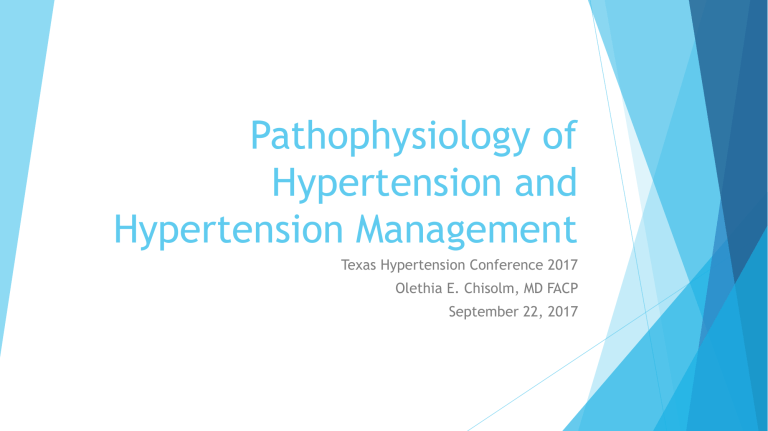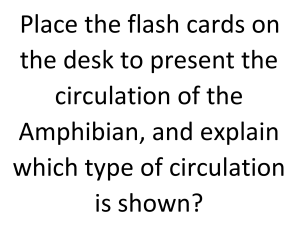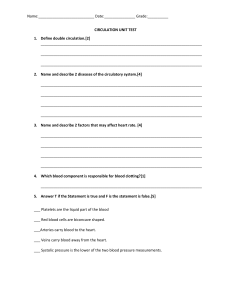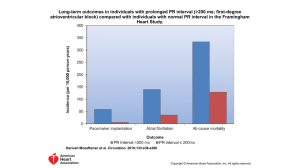
Pathophysiology of Hypertension and Hypertension Management Texas Hypertension Conference 2017 Olethia E. Chisolm, MD FACP September 22, 2017 Disclosure to Learner Requirement of Learner Participants requesting continuing education contact hours or a certificate of attendance must 1. register for the event, 2. attend the entire session, and 3. complete evaluation before leaving the conference Commercial Support This educational activity received no commercial support Disclosure of Financial Conflict of Interest The speaker and planning committee have no relevant financial relationships to disclose Off Label Use There will be no discussion of off‐label use during this presentation Non‐Endorsement Statement Accredited status does not imply endorsement by Department of State Health Services ‐ Continuing Education Services, Texas Medical Association, or American Nurses Credentialing Center of any commercial products displayed in conjunction with an activity Background Epidemiology Cost Burden High Blood Pressure Prevalence Adults ≥ 20 Years Stratified by Age/Sex National Health and Nutrition Examination Survey: 2007–2012 Dariush Mozaffarian et al. Circulation. 2015;131:e29-e322 Copyright © American Heart Association, Inc. All rights reserved Age-Adjusted Trends for High Blood Pressure Prevalence Adults ≥ 20 years Stratified by Age/Race/Ethnicity/Sex National Health and Nutrition Examination Survey: 1988–1994, 1999–2006, and 2007–2012 Dariush Mozaffarian et al. Circulation. 2015;131:e29-e322 Copyright © American Heart Association, Inc. All rights reserved High Blood Pressure Stratified by Age Awareness/Treatment/Control of Blood Pressure National Health and Nutrition Examination Survey: 2007– 2012 Dariush Mozaffarian et al. Circulation. 2015;131:e29-e322 Copyright © American Heart Association, Inc. All rights reserved Percentage Breakdown of Deaths Attributable to Cardiovascular Disease United States 2011 Dariush Mozaffarian et al. Circulation. 2015;131:e29-e322 Copyright © American Heart Association, Inc. All rights reserved Cardiovascular Disease (CVD) Deaths Versus Cancer Deaths by Age United States 2011 Dariush Mozaffarian et al. Circulation. 2015;131:e29-e322 Copyright © American Heart Association, Inc. All rights reserved Direct and Indirect Costs of Cardiovascular Disease (CVD) and Stroke (in billions of dollars) United States 2011 Dariush Mozaffarian et al. Circulation. 2015;131:e29-e322 Copyright © American Heart Association, Inc. All rights reserved The 23 Leading Diagnoses for Direct Health Expenditures (in billions of dollars) United States 2011 Dariush Mozaffarian et al. Circulation. 2015;131:e29-e322 Copyright © American Heart Association, Inc. All rights reserved Projected Total Costs of Cardiovascular Disease (CVD), 2015 to 2030 (in billions of dollars) United States 2012 Dariush Mozaffarian et al. Circulation. 2015;131:e29-e322 Copyright © American Heart Association, Inc. All rights reserved Age-Specific Prevalence of Hypertension in US Adults NHANES 1999–2004 Wilbert S. Aronow et al. Circulation. 2011;123:2434-2506 Copyright © American Heart Association, Inc. All rights reserved Pathophysiology Essential Hypertension Secondary Hypertension Conceptual Framework for Cardiovascular Adaptations to Arterial Stiffening that Occur with Aging Wilbert S. Aronow et al. Circulation. 2011;123:2434-2506 Copyright © American Heart Association, Inc. All rights reserved CV and renal continuum: RAAS as a mediator of pathophysiology Atherothrombosis & progressive CVD Tissue injury (MI, stroke, renal insufficiency, PAD) Early tissue dysfunction Oxidative & mechanical stress inflammation Pathological remodeling RAAS Target organ damage Vasoconstriction/Na/H2O retention (High BP) Risk factors ESRD = end-stage renal disease End-organ failure (CHF, ESRD) Death Adapted from Dzau V et al. Circulation. 2006;114:2850-70. RAAS overview: Key targets Angiotensinogen (1-14) Cathepsin D Tonins Tissue RAAS Renin Bradykinin Angiotensin I (1-10) Chymase ACE Angiotensin II (1-8) Negative feedback via AT1-R EP ACE2 Angiotensin (1-7) AT1-R AT2-R Substance P AT1-7-R Aldosterone ACE KININASE II AMP-B AMP-N Angiotensin IV (3-8) Inactive peptides AT4-R mas receptor Stimulation Inhibition Alternative pathways Adapted from Staessen JA et al. Lancet. 2006;368:1449-56. Treatment Lifestyle Modification Special Populations Treatment of Hypertension in Patients With Coronary Artery Disease Summary of BP Goals BP Goal, mm Hg <140/90 <130/80 Abdominal Aortic Aneurysm(AAA) Blood Pressure (BP) Heart Failure (HF) Ischemic Attack (TIA) Condition Class/Level of Evidence CAD IIa/B ACS IIa/C HF IIa/B CAD IIb/B Post–myocardial infarction, stroke or TIA, carotid artery disease, PAD, AAA IIb/B Acute Coronary Syndrome (ASC) Coronary Artery Disease (CAD) Peripheral Arterial Disease (PAD) Transient Circulation 2015;131:e435-e470 Pharmacological Treatment of Hypertension in the Management of Ischemic Heart Disease ACEI or ARB Diuretic βBlocker Stable Angina 1* 1† 1 2‡ ACS 1* 1† 1§ 2‡ HF 1 1† 1¶ Nitrat es Aldosteron e Antagonist 2 1 2 2 2 2‖ 2 1‖ Non-DHP DHP CCB CCB Hydralazine/ Isosorbide Dinitrate 2 ACEI indicates angiotensin-converting enzyme inhibitor; ACS, acute coronary syndrome; ARB, angiotensin receptor blocker; CCB, calcium channel blocker; DHP, dihydropyridine; HF, heart failure; 1, drug of choice; and 2, “add-on,” alternative drug, or special indications. ↵* Especially if prior myocardial infarction, left ventricular systolic dysfunction, diabetes mellitus, or proteinuric chronic kidney disease is present. ↵† Chlorthalidone is preferred. Loop diuretic should be used in the presence of HF (New York Heart Association class III or IV) or chronic kidney disease with glomerular filtration rate <30 mL·min−1·1.73 m−2. Caution should be exercised in HF with preserved ejection fraction. ↵‡ If β-blocker is contraindicated, a non-DHP CCB can be substituted, but not if left ventricular dysfunction or HF is present. Caution should be exercised if combining a non-DHP CCB with a β-blocker Circulation: 2015;131:e435-e470 Recommendations: The <140/90-mm Hg BP target is reasonable for the secondary prevention of cardiovascular events in patients with hypertension and CAD (Class IIa; Level of Evidence B). A lower target BP (<130/80 mm Hg) may be appropriate in some individuals with CAD, previous MI, stroke or transient ischemic attack, or CAD risk equivalents (carotid artery disease, PAD, abdominal aortic aneurysm) (Class IIb; Level of Evidence B). In patients with an elevated DBP and CAD with evidence of myocardial ischemia, the BP should be lowered slowly, and caution is advised in inducing decreases in DBP to <60 mm Hg in any patient with diabetes mellitus or who is >60 years of age. In older hypertensive individuals with wide pulse pressures, lowering SBP may cause very low DBP values (<60 mm Hg). This should alert the clinician to assess carefully any untoward signs or symptoms, especially those resulting from myocardial ischemia (Class IIa; Level of Evidence C). Circulation. 2015;131:e435-e470 Special Populations Treatment of Hypertension in Patients With Heart Failure Recommendation for Prevention Clyde W. Yancy et al. Circulation. 2017;136:e137-e161 Copyright © American Heart Association, Inc. All rights reserved Recommendation for Hypertension in Stage HFrEF Clyde W. Yancy et al. Circulation. 2017;136:e137-e161 Copyright © American Heart Association, Inc. All rights reserved Recommendation for Hypertension in Stage HFpEF Clyde W. Yancy et al. Circulation. 2017;136:e137-e161 Copyright © American Heart Association, Inc. All rights reserved Beckett NS et al. N Engl J Med 2008;358:1887-1898 Beckett NS et al. N Engl J Med 2008;358:1887-1898 Conclusion Evidence based data concludes the use of antihypertensive treatment with indapamide (sustained release), with or without perindopril, is beneficial for hypertensive persons < 80 years of age


